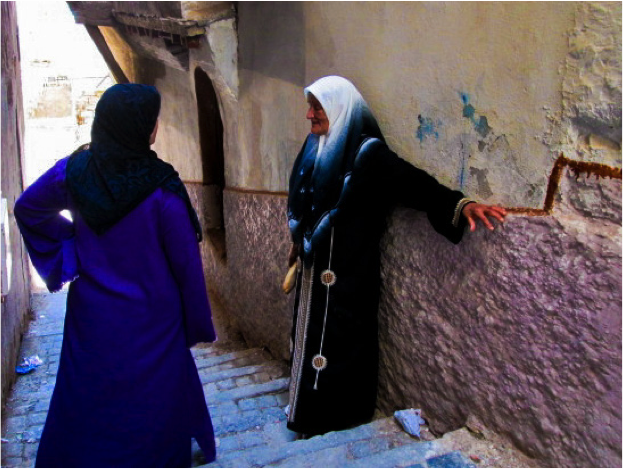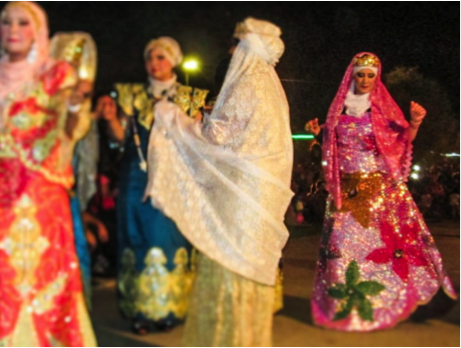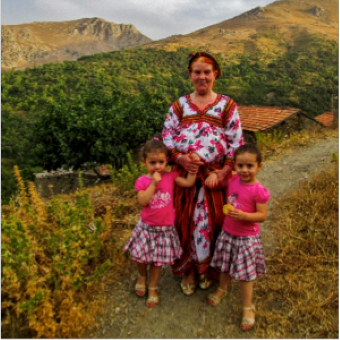Decolonizing Modernity and the Celebration of Tradition: Exploring Spaces of Feminine Perseverance in Algeria
March 16, 2017
By Michelle Mann
I arrived in the square, gingerly eating my prepackaged ice cream cone and feeling exposed as I walked past the bored shop owners with my light tunic, blond hair and loose cropped pants. In Algeria, a country with strict visa requirements and very few tourists, foreigners are never anonymous, especially not if they are walking in the historic neighborhood streets between Rue Didouche, Moustapha Pacha hospital and the Algiers train station on a quiet Friday after prayer time.
Tired of acting like I knew where I was going when I didn't, I quietly took a seat among a group of heavily veiled women sitting together in the Meissonnier square. "Salamu alaykum," I said with a nod. "El jau skhana el youm, n’est ce pas?" ("It is very hot today, don'’t you think?") After a few minutes of skeptical stares and giggles from the women, one elderly and frail-looking woman, her face daintily covered with the traditional Algerian haik, began to speak to me in perfect and eloquent French. She grabbed my hand with surprising strength and explained that she was going to adopt me for the afternoon, since it was terribly sad and not entirely proper for me to be all alone in the streets on the holy day of rest.
Zoubida, I learned, was nearing her 87th birthday. A lifelong resident of Algiers, she knew every street, every building, and recalled decades of history with astonishing clarity. For hours we sat in her favorite spot under the shade of the hospital as she told me about her life — how her father had fought in the French army during the First World War, how she had been called a dog by a French nurse and refused treatment at that very hospital as a child, how she had lived in the Casbah during the fight for independence, how she had survived the terrorist attacks and military reprisals that had occurred during the Algerian Civil war of the 1990s. Now, she told me proudly, she lived right next to the hospital, and could get free treatment whenever she needed it. "I don't understand why the young people want to leave," she mused, "after we fought so hard to give them all of this. What more can they possibly want?"
 Algeria is a beautiful land of palpable paradox: full of hope and disillusionment, solidarity and factionalism, where the weight of the past both forges an intensely strong sense of national purpose, and lays heavily upon the possibilities of the future. As a PhD student who had spent several years trying to find Algerian voices hidden in the punctual language and unrelenting pragmatism of the French colonial archives, I was overwhelmed, and humbled, by the forthrightness and willingness of Algerians — particularly Algerian women — to share their own experiences and stories.
Algeria is a beautiful land of palpable paradox: full of hope and disillusionment, solidarity and factionalism, where the weight of the past both forges an intensely strong sense of national purpose, and lays heavily upon the possibilities of the future. As a PhD student who had spent several years trying to find Algerian voices hidden in the punctual language and unrelenting pragmatism of the French colonial archives, I was overwhelmed, and humbled, by the forthrightness and willingness of Algerians — particularly Algerian women — to share their own experiences and stories.
 Zoubida's hospitality and candor inspired me to spend the rest of my two-month research trip listening to and learning from the women of Algiers. I talked for hours with the housekeepers at my residence, I visited the female keepers of the saintly shrines of Algiers and Oran, and sat with the pious women of the new Great Mosque in Oran. I chatted with young mothers in the hammams, admired the skill and craftsmanship of products made by rural women on display at officially sponsored cultural festivals, and cried with the other guests at the wedding of Zoubida's niece each time she stepped out of her bridal chamber in a different, stunningly beautiful, handcrafted gown.
Zoubida's hospitality and candor inspired me to spend the rest of my two-month research trip listening to and learning from the women of Algiers. I talked for hours with the housekeepers at my residence, I visited the female keepers of the saintly shrines of Algiers and Oran, and sat with the pious women of the new Great Mosque in Oran. I chatted with young mothers in the hammams, admired the skill and craftsmanship of products made by rural women on display at officially sponsored cultural festivals, and cried with the other guests at the wedding of Zoubida's niece each time she stepped out of her bridal chamber in a different, stunningly beautiful, handcrafted gown.
I discovered what many in Algeria already know — that Algerian women constitute a major source of their nation’s cultural strength. During the colonial era, women played a significant role in anti-colonial resistance by preserving and transmitting cultural practices seen as "authentic" to Algerian identity. During the Algerian War of Independence, women were active participants who carried weapons, placed bombs, transmitted messages, hid materials and even fought in combat. In addition to hardship and the loss of loved ones many suffered torture, sexual abuse or displacement. In the decades following Algerian independence, the country has struggled to define the role and status of women, as part of a larger struggle between religious and secular visions of the country's postcolonial identity.
The ongoing discourse about Islam’'s place in Algerian society is rooted in the nation's complex colonial past. Algerian society was, and still is, deeply marked by the influence of French culture and language, a reality which sits uncomfortably alongside a deep bitterness as part of the legacy of the long history of French colonial violence. Many young adults, who lived through the civil war but not the war of independence, seem to feel both pride and muted frustration at what they see as the unfulfilled potential of their country. This young generation of Algerian women and men have ambition and drive to undertake new projects, to help their country grow and progress, but feel blocked by a lack of agreement about what direction that progress should take.
This tension is nowhere more apparent than in the question of women's place and status in Algerian society, which has long been contested. Many Algerian women are extremely proud of their identity as Muslims, which is deeply tied to their identity as Algerians. Algerian cultural emphasis on wifehood and motherhood allows women with these titles to have power in their families and in their communities. However, many women are also frustrated with what they see as unequal limitations on women’s dress, freedoms, and legal rights. In their interpretation, the war of independence initiated a dual struggle which is not yet completed: to free their country, and to free themselves, a sentiment richly conveyed in the literature of Assia Djebar. This struggle, which does not fit neatly into the binaries we associate with secular feminism in the industrialized West, continues to this day — on the margins of public discourse, but ever present.
From the perspective of the Algerian government, the interrelated questions of Islam, secularism, and women's rights remains extremely delicate. The Algerian Constitution is based upon a commitment to equality, but Algerian social and cultural authenticity are also bound up in a commitment to Islamic values.
 In this context, cultural celebration provides a good middle ground, a culturally authentic, inclusive and relatively uncontentious outlet, a space for celebrating women's roles in Algerian society in a way which brings women into the public sphere without affronting the moral sensibilities of more conservative members of society. This emphasis is evidenced in the government's sponsorship of a wide range of female-dominated cultural celebratory events: from storytelling festivals in Kabylie, to catered receptions for female artisans, to a major month-long summer carnival (Dar -Djaza’ir) that highlights the dress and dance of a different region each night. These efforts to celebrate feminine traditions of cultural perseverance, I believe, show the resiliency and strength of living cultural tradition in Algeria, and constitute an essential means for the decolonizing of modernity through an emphasis on tradition as living, evolving practice.
In this context, cultural celebration provides a good middle ground, a culturally authentic, inclusive and relatively uncontentious outlet, a space for celebrating women's roles in Algerian society in a way which brings women into the public sphere without affronting the moral sensibilities of more conservative members of society. This emphasis is evidenced in the government's sponsorship of a wide range of female-dominated cultural celebratory events: from storytelling festivals in Kabylie, to catered receptions for female artisans, to a major month-long summer carnival (Dar -Djaza’ir) that highlights the dress and dance of a different region each night. These efforts to celebrate feminine traditions of cultural perseverance, I believe, show the resiliency and strength of living cultural tradition in Algeria, and constitute an essential means for the decolonizing of modernity through an emphasis on tradition as living, evolving practice.
In our upcoming conference, "Women as Agents of Change? Fresh Perspectives on Gender & Religion," we will see that this is a universal as well as particular story. Women of all faiths — Muslim, Christian, Jewish, secular — are seeking to find new ways of reconciling cultural traditions and identity with a desire for autonomy and equality. Each of our panelists will explore how women across time and space have employed similar techniques: negotiating spaces of freedom between conflicting systems, and celebrating tradition as a means of pressing for change. Join us for what will assuredly be a stimulating discussion of the many ways that women are negotiating spaces of liberty and perseverance between tradition and modernity.
Michelle Mann recently received her PhD in history from Brandeis University, and is currently teaching for the Brandeis Writing Program and the Brandeis Summer School. Her work analyzes the history and evolution of modern European-Muslim relations in the Western Mediterranean.
Special Event
"Women as Agents of Change? Fresh Perspectives on Gender & Religion," co-sponsored by the the HBI and the International Center for Ethics, Justice, and Public Life, was Wednesday, March 29, 2017, at the Hadassah-Brandeis Institute. Speakers included Brandeis University doctoral candidates April French on Baptist and Pentecostal women in Siberia during the Soviet era, Natalie Cornett on 19th-century Polish women's activists, Michelle Mann on women in Algerian society and HBI 2016 SIR Geraldine Gudefin on Jewish women in early 20th-century U.S., and was moderated by Lisa Fishbayn Joffe, associate director of HBI.